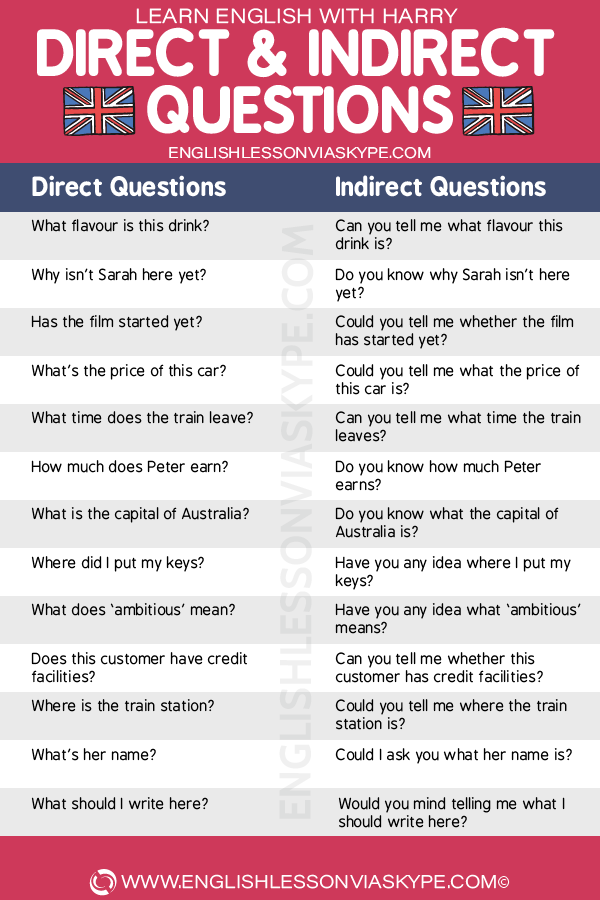Do you know how to ask indirect questions in English?
Firstly, we need to learn what an indirect question is. Then we’ll learn what is the difference between direct and indirect questions. Lastly, we’ll learn why it is better to ask indirect questions in English.
Harry
stop asking direct questions in english!

Share and help other students to improve English
Thanks for joining me again.
Today, we’re going to look again at some grammar.
We’re going to look at how to ask indirect questions in English.
As you probably already know, there are two types of questions in English.
Direct and indirect.
A direct question is usually:
What is your name?
How did you get here?
Who are you?
So very direct and often can sound a little bit rude.
We don’t want to sound rude, do we?
And we also want to give someone a good feeling. So what do we do then?
Intermediate to Advanced English Marathon

INSANITY: doing the same thing over and over again and expecting different results.
Albert Einstein
- What you'll learn:
- better understanding of more complex grammar structures
- advanced English vocabulary words
- British & American slang
- perfect your listening skills through practing different accents
- This marathon is for you if you're:
- stuck at an intermediate English level
- tired of confusing explanations
- a mature student
- shy & introverted

It’s really quite simple.
All we need to do is to change those direct questions into indirect questions.
We just add some words or phrases at the beginning. This takes the stress away from the who, what, where, when and turns them into indirect questions.
So you sound more polite and as a result people are more likely to answer your question.
So, particularly if you’re a foreigner to English shores and you want to find some place, hotel, bank, airport, whatever it is, try and make your questions indirect.
You’re more likely to get a response and more likely to get a positive response.
Direct and Indirect Questions in English
So let me give you these examples.
Direct question:
Where is the post office?
So if you stopped somebody in the street and asked them a direct question like this, they might look at you, they probably would help you, but it’s not so polite.
Let’s change it into an indirect question.
Could you tell me where the post office is?
Much, much more polite, much more likely to get you a positive response.
And be very careful here when you see the direct question:
Where is the post office?
Note the word order here, where the word is, okay?
When we use the indirect question is goes to the very end of the sentence.
Could you tell me where the post office is?
So that’s a really critical part of these indirect questions.
That is a really important, because if you say it in another way, then it’ll sound a little bit strange and people will know that you’re not a native speaker.
Direct and Indirect Questions in English

Second example:
Has John been invited to the party? – direct question
Do you know if John has been invited to the party? – indirect question
As I said, the indirect question is more likely to get you a nice response. And again, here, look at where the verb is.
And then the third example:
How does this work? – direct question
So you’re looking at some piece of machinery or mobile phone or some bit of technology and you just ask somebody ’how does this work?’
It’s grammatically correct but it sounds very rude.
How to Ask Indirect Questions in English?
Let’s now turn that into an indirect question:
Could you please explain how this works?
Could you please explain how this works?
Very indirect, very polite, and very definitely likely to get you the answer that you want.
When we want to ask questions then we try and avoid direct questions where possible. They can come across as a little bit impolite even though you may not intend it that way. That’s often how they sound.
Just by adding some nice phrases:
- Would you mind …
- Could you please …
- Could I ask you …
- Is it possible …
- Do you know …
you can change the sentence immediately into an indirect question.
Now you know how to ask indirect questions in English.
Enjoy your English!
Indirect or Embedded Questions in English

More Information
For more information on everyday English expressions, English collocations and English idioms, check out the following links:
10 Better ways to apologise in English
Free resources for intermediate and advanced English as Learning English with the BBC.
You will love these English lessons

12 English Idioms Relating to Communication
Here you will learn 12 English idioms relating to communication: in black and white, from horse’s mouth, keep someone posted


8 Phrasal Verbs with Stop
8 Phrasal verbs with Stop with easy-to-follow explanations and examples. Stop over, stop out meaning. Boost your English vocabulary and


English Phrases To Avoid Answering A Question
Here you’re going to learn useful English phrases to avoid answering a question. These English phrases will help you when